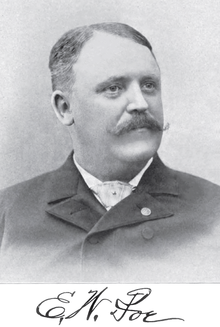Ebenezer W. Poe
Ebenezer Wilson Poe | |
|---|---|
 | |
| 15th Ohio State Auditor | |
| In office January 9, 1888 – January 13, 1896 | |
| Preceded by | Emil Kiesewetter |
| Succeeded by | Walter D. Guilbert |
| Personal details | |
| Born | November 11, 1846 Findlay, Ohio |
| Died | June 19, 1898 (aged 51) Columbus, Ohio |
| Resting place | Green Lawn Cemetery |
| Political party | Republican |
| Spouse | Caroline Thomas |
| Children | four |
Ebenezer Wilson Poe (November 11, 1846 – June 19, 1898)[1] was a Republican politician in the U.S. State of Ohio who was Ohio State Auditor 1888–1896.
Early life
Ebenezer W. Poe was born at Hancock County, Ohio on a farm near Findlay. After his father enlisted in the Union Army in 1862 during the American Civil War, he enlisted at age 16 in Company G of the One Hundred Thirty-Third Ohio Volunteer Infantry, and served in the Army of the Cumberland until mustered out in August, 1864.[2]
Mid life
Poe then re-enrolled in the high school in Findlay and graduated. He taught school for three years, was a store clerk, and in 1873 ran a store. He disposed of that business in 1875, and was a traveling salesman for six years. In 1881, the Republicans nominated him for Wood County Auditor, he won, and was re-elected in 1883.[2]
State office
At the 1887 Republican State Convention, Poe won on the first ballot in a field of seven for the nomination for Ohio State Auditor.[2] He defeated incumbent Democrat Emil Kiesewetter in the general election.[3] He won re-election in 1891.[4]
At the 1895 Republican State Convention, Poe was among eight candidates for the Governor nomination, and, after the third ballot, threw his support to eventual nominee and Governor Asa S. Bushnell.[2][5] After his term as Auditor expired, he associated with an Equitable Life Insurance.[2]
Personal
Poe was married October 8, 1868 to Caroline Thomas of McComb, Ohio, and had four children.[2]
Poe died June 19, 1898 in Columbus, Ohio.[6] He was a member of the Independent Order of Odd Fellows and Grand Army of the Republic, and was a Methodist.[6] He was interred in Green Lawn Cemetery, Columbus, Ohio.[1]
Notes
- ^ a b political graveyard
- ^ a b c d e f Smith 1898 volume 2 : 96–97
- ^ Smith 1898 volume 1 : 541
- ^ Smith 1898 volume 1 : 604
- ^ Smith 1898 volume 1 : 662
- ^ a b Taylor 1909 : 644-645
References
- Smith, Joseph P, ed. (1898). History of the Republican Party in Ohio. Vol. I. Chicago: the Lewis Publishing Company.
- Smith, Joseph P, ed. (1898). History of the Republican Party in Ohio. Vol. II. Chicago: the Lewis Publishing Company.
- Taylor, William Alexander (1909). Centennial history of Columbus and Franklin County, Ohio. Vol. 1. Chicago: S J Clarke Publishing Company. p. 644.

